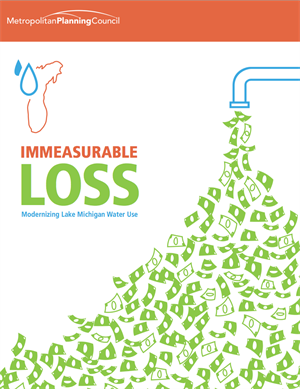
Flickr user fortun8 (cc)
Proposed changes to the Lake Michigan water permitting rules make the data collection process more transparent.
I like getting to comment on progress, and so I'm happy to note that a couple of weeks ago the Ill. Dept. of Natural Resources (IDNR) posted proposed rule changes related to Lake Michigan water use permits for First Notice with Illinois' Joint Committee on Administrative Rules. That kicks off a minimum 45-day public comment period, after which IDNR staff has a chance to review that public input, make any edits they see fit, and submit for Second Notice. Then the six State Senators and six State Representatives that make up the Joint Committee will vote on whether the proposed rule changes will go into effect.

That's the process for making progress. What I am happy about is that the proposed changes will substantially improve how we manage, use, conserve and account for our water supplies from Lake Michigan. This is a topic Metropolitan Planning Council (MPC) explored in depth in 2013's Immeasurable Loss: Modernizing Lake Michigan Water Use, and many of the proposed changes are very consistent with the recommendations in that report (which makes me doubly happy). Over the course of the last year IDNR staff have been sharing and discussing a draft of these rules with a wide range of stakeholders in northeastern Illinois, and the actual proposals clearly reflect those conversations. Many municipal public works officials were concerned about the draft timeline for meeting the water loss threshholds set by the rules in particular, and IDNR has modified that to have a gradual phase-in period that should be more palatable.
Some highlights:
- No more Unaccounted for Flow or Maximum Unavoidable Leakage. These are the terms used in the current water loss estimation process, and neither the terms nor the estimation really tell us that much about where, how and how much treated water we lose through real leaks or through metering and billing issues (again, all of this is explained in detail in Immeasurable Loss). The new term is Non-Revenue Water, which speaks to the heart of the matter. This is water we pay to process, but never appears on a bill (for a variety of reasons). The new rules include a new method for calculating that loss, which should move individual communities and the state as a whole to a more accurate and useful understanding of our water use.
- The phase-in period for Non-Revenue Water threshholds. In the past permit holders were supposed to keep Unaccounted for Flow to less than 8 percent of total water pumpage. However, because of the estimation process for that, the numbers never meant very much, and we had no real idea whether anybody was below, at or above 8 percent of anything. Now it's more straightforward: Non-Revenue Water of no more than 12 percent of pumpage by 2015, no more than 10 percent by 2019 and thereafter. This may look like IDNR is backing off or lightening up (because 12 and 10 are both bigger than 8), but in reality, since the previous process was so unreliable, we should be much better off this way.
- Partial allocations for new applicants. Historically, a permit holder had to use only Lake Michigan water once it got a permit (in essence, shutting off any wells they might have had). This has worked well, but for communities in the western and southern extremes of our region that still use groundwater or river water, being able to get a partial allocation of Lake Michigan water will give them greater flexibility in managing costs and water, particularly in times of drought. A place like Aurora, for instance, uses mostly Fox River water these days, with some deep groundwater, but in dry times river levels drop and aquifer pumpage goes up. Unfortunately, aquifer pumpage surges for their neighbors at the same time, and that puts great pressure on groundwater. If Aurora had a partial allocation of Lake Michigan water, it could adapt to the lower river levels without increasing pressure on the aquifer. That's a good thing.
- Conservation standards. The new permit rules provide stronger guidance on lawn watering, plumbing standards and water pricing, all of which will lead to more efficient use of our finite diversion of Lake Michigan water. For lawn watering in particular, the new permit rules encourage communities to have an ordinanace that closely resembles the model ordinance recently approved by the Northwest Water Planning Alliance, which means there is a ready-to-use, turnkey solution available the region.
Again, just some highlights. Overall I am quite pleased with the proposed changes, and Ill. Dept. of Natural Resources staff should be commended for advancing proposals that make sense, improve our water management, and are responsive to the concerns of stakeholders in northeastern Illinois.